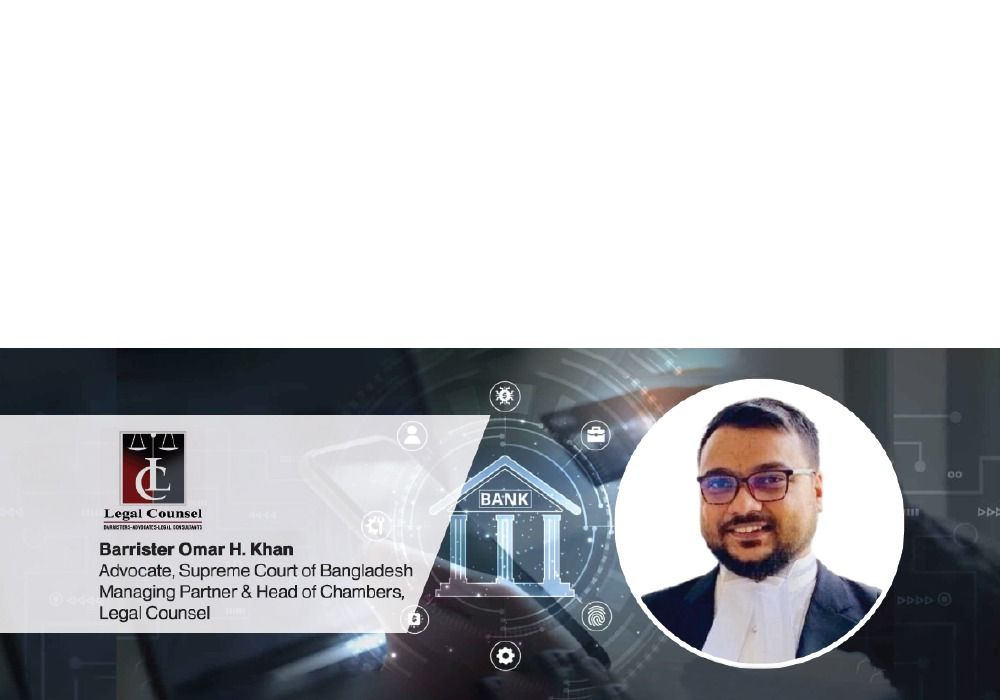- info@ficci.org.bd
- |
- +880248814801, +880248814802
- Contact Us
- |
- Become a Member
- |
- |
- |
- |
- |

A Turning Point in Finance
Bangladesh is at a mature state in its economic journey. The rise of digital finance - from mobile payments to online banking - has not only changed how people transact, but also significantly impacted their perception about money, it savings and expenditures. With the forthcoming graduation from LDC to a developing economy, the country is clearly moving towards a less-cash society, if not towards a fully cashless one.
This shift is not just about transactional convenience, expansion of e-commerce or technological innovation. It is also about inclusion, regulation, and most importantly legal protection - for citizens and for investors. For companies and financial institutions eyeing opportunities here, understanding the legal framework is essential.
 Digital Finance: Reaching Millions
Digital Finance: Reaching Millions
What was once a cash-heavy economy is now home to over 110 million mobile financial service (MFS) accounts. Whether it is a garment worker AMAS receiving salary and sending money home, a small
business accepting payments via QR code, or a rural farmer receiving government aid, an elderly paying of all bills etc. digital finance is now a part of everyday life. I have even heard rickshaw-pullers receiving their fares in MFS accounts.
Platforms like bKash, Nagad, and Rocket etc. have led this growth. With billions of taka moving digitally each day, the economy is being rewired from the ground up. Importantly, this transformation is helping reduce the urban-rural divide, giving many their fast access to formal financial services and by saving valuable work hours.
Legal Foundations: A Work in Progress
It has been found that in case of technological advancements, law falls behind the technology. Most of the times, innovation happen much earlier than the regulation to deal with the same in formulated. So, how has Bangladesh's legal system responded to this digital surge?
1. Regulatory Role of Bangladesh Bank
The central bank of Bangladesh, namely, the Bangladesh Bank (BB) has played a central role, laying down rules through its Mobile Financial Services Guidelines. These cover who can operate, how they must handle customer data, transaction limits, and more. Updates over the years show BB's attempt to balance innovation with security.
 A key milestone has been the introduction of Interoperable Digital Transaction Platform (IDTP), which allows users to transfer money across different MFS and bank accounts. Legally, this step improves fairness, competition, and user convenience - a rare trifecta in financial regulation.
A key milestone has been the introduction of Interoperable Digital Transaction Platform (IDTP), which allows users to transfer money across different MFS and bank accounts. Legally, this step improves fairness, competition, and user convenience - a rare trifecta in financial regulation.
 2. Payment Systems and Fintech Oversight
2. Payment Systems and Fintech Oversight
The Bangladesh Payment and Settlement Systems Act 2024 and Regulation 2014 offer a broader framework for digital payments. More recently, fintech startups - offering microloans, Al-powered credit scoring, and digital wallets - have come under the regulators' radar.
A Fintech Regulatory Sandbox has been introduced by the BB, which would let new businesses test their models in a controlled legal environment. This could be a welcome move for foreign investors looking to partner with or enter the local fintech space.
 3. Data Security and Privacy Laws
3. Data Security and Privacy Laws
Trust is certainly the 'key' in all digital transactions. While laws like the Information and Communication Technology Act 2006 and the Digital Security Act 2018 replaced with the Cyber Security Act, 2023 provide some legal coverage, Bangladesh is still in the process of finalizing a comprehensive Data Protection law.
The proposed law, namely, the Personal Data Protection Ordinance, 2025 once passed, is expected to set clear rules around how personal data is collected, stored, and used.
 4. Money Laundering and Risk Controls
4. Money Laundering and Risk Controls
With digital growth comes different types of risks - especially around fraud and financial crime. The Money Laundering Prevention Act 2012 and the Anti-Terrorism Act 2009 apply equally to digital finance. BB has also mandated biometric verification and links to national ID systems, making it harder for bad actors to operate in the shadows.
Ongoing Legal and Regulatory Gaps
No legal system is perfect, especially in fast-moving sectors like digital finance. A few areas stand out where Bangladesh still has work to do:
. Fragmented Oversight: Several agencies like BB, BTRC, and ICT Ministry oversee different aspects of digital finance. This sometimes cause overlaps or delays. A coordinated, cross-agency approach
would certainly help.
. Financial Inclusion vs. Strict KYC: Current KYC rules can be hard to meet for people without proper ID or documentation. There is room for a tiered model that allows basic access with minimal barriers.
. Cross-border Transactions: As Bangladesh engages more with global e-commerce and fintech, laws governing foreign exchange, digital remittances, and dispute resolution will need clearer direction and periodic update.
. Investor Clarity: Foreign investors often seek clear pathways for licensing, repatriation, data compliance, and IP protection. A more transparent legal ecosystem would certainly help.

Recommendations for a Smarter Legal Future
To make the cashless transition sustainable and investment-friendly, some legal updates should be prioritized:
1. Enact the Data Protection Law - A modern data law would boost trust and align Bangladesh with global norms like GDPR.
2. Effective Fintech Sandbox - Letting firms test innovations legally will encourage responsible experimentation.
3. Improve Regulatory Coordination - A single-window authority or digital finance task force could streamline oversight.
4. Strengthen Consumer Rights - Transparency, fee disclosures, and simple complaint channels are needed to protect users, especially the newly included.
5. Increase Legal Literacy - Both consumers and small businesses would benefit from knowing their rights and how to handle disputes.
Final Thoughts
Going cashless is not just a tech trend; it is a nation-building strategy. Bangladesh has taken big steps toward a digital financial future, but it must ensure the laws are just as modern as the technical tools. For investors, this is an exciting time. It is also a time to be thoughtful, to understand the legal terrain, stay engaged with regulators, and contribute to shaping a financial system that is fair, inclusive, and ready for the next decade. With the right legal foundation, Bangladesh has the potential to lead not only in South Asia but also globally as a role model.





